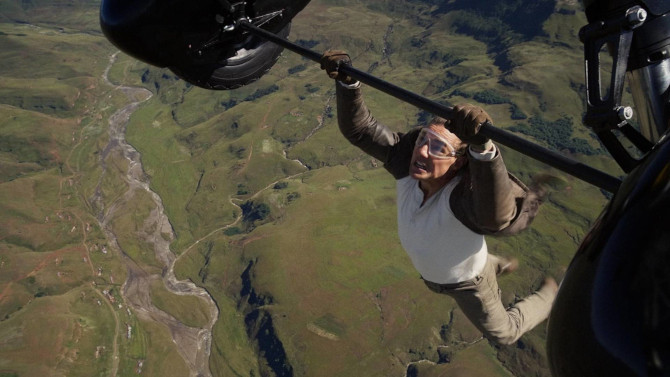
An Impossible Mission
How do you wrap up a franchise like Mission: Impossible? That is, if this even is the final installment... as they’ve made it sound (while at the same time, stars not named ‘Tom Cruise’ pipe up and suggest that might not be so). It has been twenty-nine years, with different writers and visionary directors – from twisty Brian De Palma and the action hair stylings of John Woo, to the lens flares of J.J. Abrams and animation expert Brad Bird, it was only about ten years ago that the franchise decided to opt for The Usual Suspects scribe Christopher McQuarrie for the final four. To return to that opening question once more, you could end with a Sopranos’ style cliffhanger, simply make another entertaining movie like the many before – like Everybody Loves Raymond did it with its final episode, or try to tie everything up in a neat little bow by bringing everything together as the Daniel Craig era did with James Bond. Well, it is definitely more along the lines of the latter example, with some distinct differences.
-
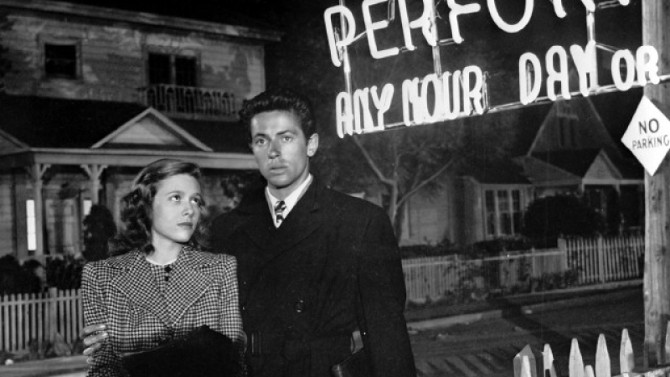
Inside Outsiders
They Live by NightNovember 4, 2018Taking noir genre tropes and flipping them on their heads, Nicholas Ray’s They Live by Night (1948) challenges the city setting, the cynical detective, the sultry femme fatale, and at every turn, finds a clever way to surprise and intrigue. An intimate look at the lives of outsiders (a Nicholas Ray speciality – think In a Lonely Place; Rebel Without a Cause), three individuals have escaped the confines of prison. . . guys who would easily be picked out of a lineup: one-eyed Chickamaw (Howard Da Silva) – a sinister man, quick to anger when his missing socket is mentioned; monstrous T-Dub (Jay C. Flippen) – though he seems sensible, there is a violent streak hidden just below the face only a mother could love; and baby-faced Bowie (Farley Granger) – the meek getaway driver of the gang.
-

Missed the Bloody Cut: 2018 (Part 2)
October 30, 2018This second Missed the Bloody Cuts feature of 2018 (which follows the article posted on September 23rd) will also be the closing chapter of this year’s run of horror movies leading up to Halloween. And it has been nothing but a violently good run – spooky comedies from the Golden Age of Hollywood, cult classics, B horror flicks, British takes on the genre and everything in between. . . and this second set of reviews (which falls just below the 7.0 rating) resuscitates two lesser known 1970's motion pictures back from the grave. 1972's Season of the Witch (originally released as Hungry Wives and then re-released as Jack’s Wife) is the third film from zombie mastermind George A. Romero, a witch-tinged drama with horror themes. Following housewife Joan Mitchell (Jan White), the woman is haunted by her subconscious. . . living in a sedate marriage with a controlling husband who is oft on the road, Jack (Bill Thunhurst), the troubles of her bland life come out in her peculiar, disorienting dreams.
-
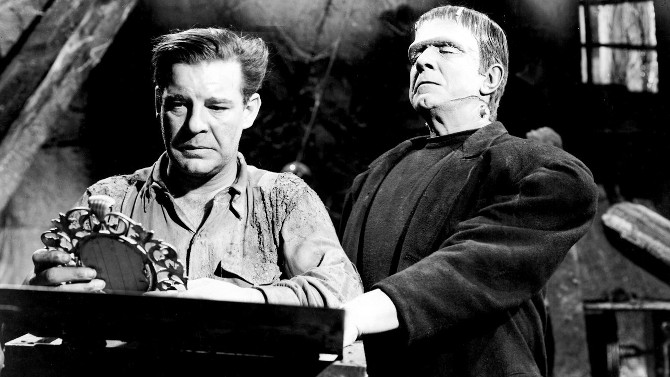
Gold, Frankenstein and Mirth (Don’t Forget the Wolf Man)
Frankenstein Meets the Wolf ManOctober 26, 2018The first of the Universal monster movie crossovers (which is celebrating its 75th anniversary this 2018), 1943's Frankenstein Meets the Wolf Man comes as the fourth sequel in the bolt-necked monster franchise, and a direct sequel to the tortured Lawrence Talbot feature, a man who was bitten by a werewolf and is now himself inflicted. Written by The Wolf Man scribe Curt Siodmak (and directed by Roy William Neill – a frequent 1940's Sherlock Holmes director), the screenwriter continues his tale of the tormented Talbot (Lon Chaney Jr. reprising his role) – cursed with the pentagram, the mark means that he is forever a pursued man (symbolic of the Star of David during World War 2, Siodmak, a German Jewish man, wrote the Wolf Man as a conduit for the horrid tale of his peoples’ torture, pain and death), a man who has supposedly been dead for four years.
-

Running Scared
2AM: The Smiling ManOctober 23, 2018Have you ever been walking late at night, and, as you travel your route, you hear someone following. . . the sound of their footsteps, slowly gaining, the ‘thud thud thud’ of their slightly quicker pace penetrating your deepest fears – your heart starting to palpitate as you pray that this is just mere happenstance and not some sort of psychotic stalker. This is the premise of the 2013 horror short: 2AM: The Smiling Man. Directed by Michael Evans (and based upon a Creepypasta – something I was unaware of until writing this article. . . it is a horror legend or image that has been copy and pasted around the Internet), the audience is placed in the shoes of a late night Roamer (Sean Simon), a twenty-something ‘anyman’ who is making his way home at 2 A.M. one night.
-
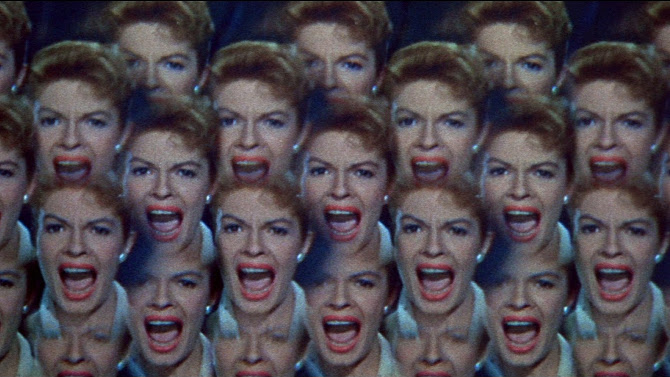
A Fly in the Ointment
The FlyOctober 19, 2018We’ve all had it happen before. . . an experiment goes awry – a recipe doesn’t turn out (and the cake somehow turns green), or we simply think ‘the old Mentos in a bottle of Coke trick’ is just a myth, but you’ve likely never had a day quite like scientist André Delambre (David Hedison – the only actor to play Felix Leiter in two James Bond flicks), a moment that will change his life forever – so, without further ado, I present to you 1958's: The Fly. Written by James Clavell (based upon a short story by George Langelaan) and directed by Kurt Neumann, the story is set in exotic Montreal, the french speaking Canadian city that is one of the oldest continuously inhabited locations in North America. It is here that a wealthy industrialist family is seemingly struck by a more than unusual tragedy – André Delambre has been found dead, head and arm obliterated by a hydraulic press. . . further adding to the mystery, his loving wife Hélène (Patricia Owens) is seen running from the scene of the crime.
-
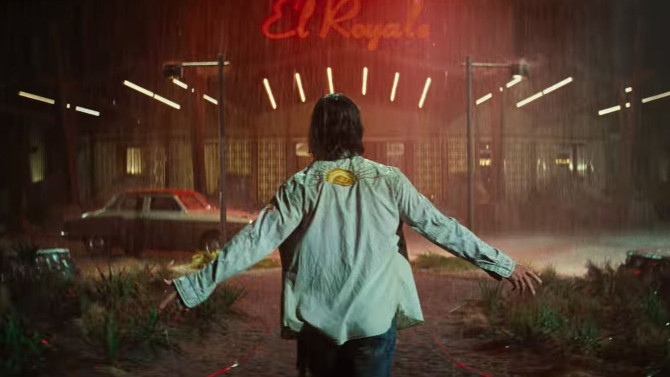
Royale Rumble
Bad Times at the El RoyaleOctober 16, 2018Twenty-first century film studios have a very strict checklist as to which movies they produce. Sequels, spinoffs, crude comedies, reasonably priced horror flicks, animated fare, name/brand recognition, award hopefuls. . . all of this meaning that very few adventurous, risky projects get made anymore. Gone are the days (for the most part), when adult oriented features like Basic Instinct and Body Double graced the silver screen, or edgier family films such as Adventures in Babysitting, The Neverending Story, and Home Alone were made – whether you love them or hate them, they did not fit your prototypical mould. So, when a 2018 motion picture that is so far outside of the stratosphere gets a thirty-two million dollar budget (thank you 20th Century Fox – which may soon be snapped up by Disney. . . a worrisome acquisition for moviegoers, as the bloated studio already owns Lucasfilm, Marvel, The Muppets Studio, and Pixar), it is an exciting day for cinephiles and adventurous moviegoers. So, welcome to the El Royale. Bad Times at the El Royale is an R rated gem written and directed by Drew Goddard (co-scribe and director of Cabin in the Woods; adaptor for the screen of The Martian), the type of dynamic thriller that resembles a sharp British crime flick (one where we do not expect everyone to survive). As twisted as it is twisty, Goddard designs the most fascinating of settings (its own character). . . a neon-glowing, mid century modern gambling den of a motel, hidden on the outskirts of Reno, a building that straddles the Nevada/California border (and has one of those tacky red lines that indicates the boundary between states).
